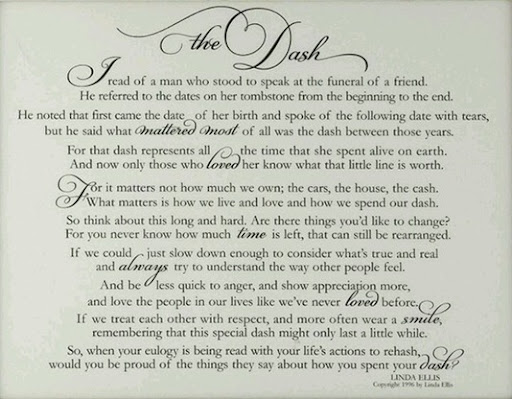


Surely one of the strangest, and least-commented-upon, aspects of the contemporary poet’s life is the importance of public readings. “The Second Hour of the Night,” in Desire, 1997 …Myrrha looped a rope over the beam above her bed As a dog whose body is sinking into quicksandĪbove it, the great teeth grasping so fiercely the stable world
The dash poem free#
Sliding through dependent clauses, his poetics is both one of speed, as he nimbly draws the reader forward through breakneck line breaks and of abrupt, strategic silences that stop the reader in a free fall of sorrow, or dread. I know that in Tosca, in the second act,Īnd in torment, bewilderment, at the end she asks, Here is a passage from “Ellen West”-in which the poet-speaker turns briefly from his central anorexic character to contemplate, in an aside, opera diva Maria Callas and her troubles-that captures something of his range: The task of “fastening the voice to the page,” as he once put it in an interview, led him almost to “score” his poems, as a composer might offer notes on dynamics-diminuendos, con spiritos, crescendos-by capitalizations, italics, and unusual punctuation, such as a semicolon followed by a dash. So telling is his “subject matter” that his extraordinary poetics-his mastery of the line, of diction, white space, typography, and punctuation-almost disappears for the reader urgently moving through the poem. “Seduction,” in Watching the Spring Festival, 2008īidart humanizes monsters (among the other characters who have inhabited his poems we can find John Wayne Gacy and Ovid’s doomed incestuous couple Myrrha and Cinyras) and also makes us see how monstrous our ordinary humanity is. They wish they had not done what they did they fear they will do what they do not-and do-wish to do: They desire what they know they should not desire. They want the dead to come back to life they want whomever they love to love them in return they want to transcend the limits of the flesh and be immortal. Himself a child of the “confessional” poetry of the 1950s and 1960s-he was a student and friend of Robert Lowell’s-he has taken the mode of confessional poetry to a kind of logical conclusion, away from penitent speaking to priest, or patient speaking to therapist, all the way to the tormented, divided psyche speaking to itself, as it does again and again in these new poems:Įven when, memorably, Bidart has chosen to adopt the voices of various personae-the mad Nijinsky (“The War of Vaslav Nijinsky,” 1983), or an anorexia patient (“Ellen West,” 1977), or a child molester and killer (“Herbert White,” 1973)-the “confessions” offered by these characters are oddly, horrifyingly familiar and unspectacular, as is the language they use: they, like us, want what they cannot have. Frank Bidart at a celebration of the centenary of Elizabeth Bishop, New York City, February 2011įrank Bidart writes with terrifying candor.


 0 kommentar(er)
0 kommentar(er)
